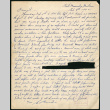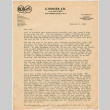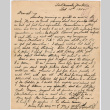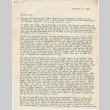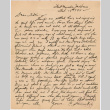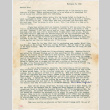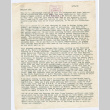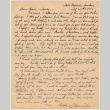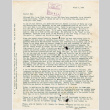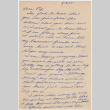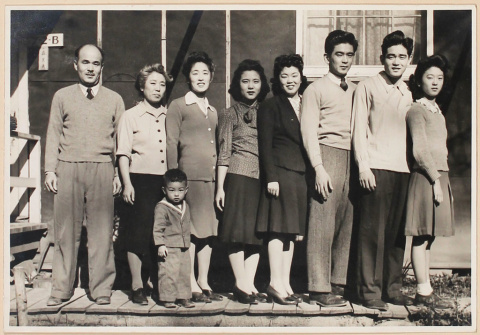PARTNER
Densho
Visit partner
COLLECTION ID
ddr-densho-379
DESCRIPTION
The Sumida Family Collection contains material about Chimata and Masako Murakami Sumida and their six children, Alice Yuriko Endo, Grace Rayko Nagai, Emmy Ito, Marshall Masaru Sumida, Theodore Tetsuro Sumida, Marjorie Yohko Matsumoto, and their families. Before World War II, Chimata Sumida owned a music store located in Los Angeles’ Japanese Town that sold music, instruments, radios, and other small electronics. After 3 FBI interrogations, Chimata and his worker, Yoshio Takashima, were arrested on January 16, 1942, detained at the Los Angeles County Jail, transferred to Tuna Canyon Detention Station, and interned at the Fort Missoula Alien Detention Center.
The collection begins with a series of letters between Chimata Sumida written during his internment in the Fort Missoula Alien Detention Center to and from his wife and children. These censored letters describe the harsh conditions and social atmosphere at Ft. Missoula and chaotic life in Los Angeles preparing for the upcoming Executive 9066 evacuation and its consequences. An important portion of this collection are copies of documents contained in Chimata Sumida’s U.S. Department of Justice file obtained from the U.S. Archives. Contained in this file are Chimata’s testimony during his Alien Enemy Hearing Board, the docketed Department of Justice Alien Enemy Hearing Board Report with its split 2-1 decision recommendation in favor of internment, the Memorandum to the Chief of the Review Division recommending parole, and the final Order signed by Attorney General Biddle granting parole under the conditions and restrictions indicated in the document.
After Chimata Sumida’s transfer to Rohwer Relocation Center, he soon became a prominent Issei leader of the camp. He met 6 days a week with more than 600 Issei nightly who listened to his translation of American News into Japanese. He served as a committeeman on the Resettlement Advisory Board and was chairman of the Resettlement Committee organized by the Community Council. In addition, he collaborated with two other Issei, T. Takashima and S. Muraoka, to submit a proposal to various U.S. government agencies to establish cooperative colonies in rural areas of the United States suitable for farming to relocate 13,000 settlers from various WRA relocation camps. This plan was ultimately rejected by Dillon Myer, Director of the War Relocation Authority.
After leaving Rohwer Relocation Camp in 1945, Chimata and Masako Sumida resettled in Washington, D.C. with their children and grandchildren. Most of the Sumida family eventually moved back to the west coast. However, the Endos remained in the Washington, D.C. area and remained active in the community. They participated in many civil rights events including the 1963 March on Washington.
INCLUSIVE UNIT DATE
1941-1953
BULK UNIT DATE
1941-1963
PHYSICAL DESCRIPTION
CONTRIBUTOR
Densho
CREATORS
PREFERRED CITATION
Courtesy of Sumida Family Collection, Densho
RIGHTS

This work is licensed under a Creative Commons Attribution-NonCommercial-ShareAlike 4.0 International License.
188 Objects
